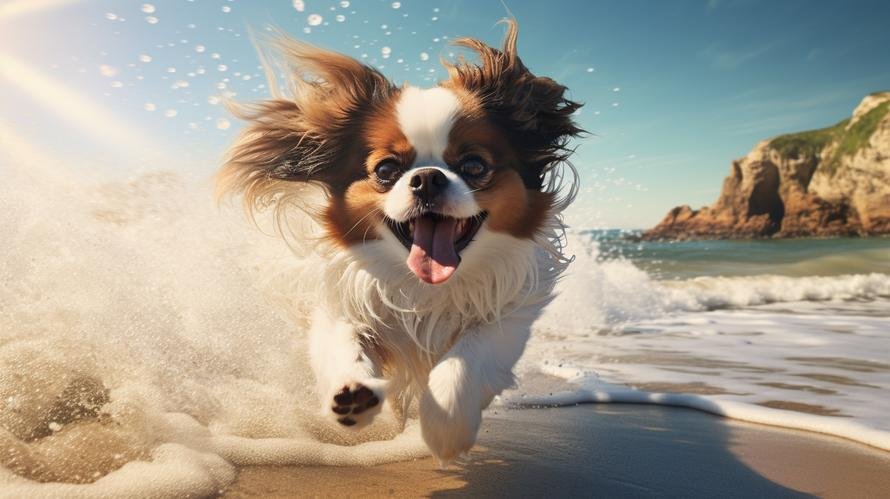As a proud owner of a dog, you might have heard about the Japanese Chin – a pet that is taking the canine world by storm with their majestic looks, and strikingly unique personalities. But have you ever wondered about the health of this intriguing breed? Stick around, as we plow through realms of dog genetics and anecdotal experience to tell you what it means to have that tiny, charming shadow trailing behind you.
First, let’s answer the obvious question: What is a Japanese Chin? As the tale goes, thousands of years ago, the emperors of China decided that they needed companionship. But being Emperors, ordinary dogs simply wouldn’t do. They set out to breed a dog that not only reflects the aristocracy but also resonates with their Zen spirituality. And thus, the Japanese Chin was born. Gifted to Japanese nobility and eventually smuggled to the West, Japanese Chins soon became the hallmarks of elegance and extravaganza.
Seizing your interest already? Just wait until we reveal some unheard tales about what it’s like to live with a Japanese Chin and whether they are healthy dogs.
The teeny Japanese Chin, with silky coats and quirky flat faces, is a healthy breed by many standards. However, their royal lineage and long history of specialized breeding might have predisposed them to some genetic health conditions. The good news is, with the right care, these dogs can live long (up to 12 – 14 years), happy lives by your side.
One condition Japanese Chins are known to commonly experience is heart murmurs, which can lead to heart disease. Early diagnosis and regular monitoring can keep this in check. If your Chin has a weird cough or seems tired all the time, it’s time you chauffeured them to the vet for an examination.
Another health concern that might bump into is Patellar Luxation, a condition where the knee cap moves out of its normal position. This is quite common in small dog breeds and might need orthopedic attention. How do you know if your Chin needs help? Joint pain, limping, and difficulty moving are some red flags that should prompt a vet visit.
The thick, flat-faced Japanese Chin can also be vulnerable to breathing difficulties and heatstroke. They can’t handle hot weather conditions or ‘irked’ physical activities. Adopting a Japanese Chin might mean transforming yourself into a thermostat, keeping track of the temperature and ensuring that they don’t over-exert themselves.
Keep an eye out for eye disorders like cataracts and progressive retinal atrophy, common in elderly Japanese Chins. Because of their poised look, eye-related issues might go unnoticed but can be serious. If Bruno is bumping into things, consult a vet immediately.
Brachycephalic Syndrome, a condition that flat-faced breeds are likely to experience, can prevent a dog from breathing normally due to short nasal passages. They are also more likely to snore, snort, and have sleep apnea. Regular vet check-ups can ensure your Japanese Chin isn’t suffocating without you noticing.
There is a humorous flip side to this otherwise doughty picture. The Japanese Chin is popularly known as the ‘cat of the dog world.’ Why? Because of their small size, agility, fondness for jumping onto furniture, its enjoyment of self-grooming, and a certain, shall we say, esteem for themselves that makes them pretty independent. Unlike other breeds, they behave more like cats, seeking lofty perches and showing independence.
Now, how do you keep your Japanese Chin healthy? It’s rather simple. Regular walks, balanced meals, vet visits, and a lot of caressing should do the trick. Fill their dishes with nutrition-rich foods like berries, honey, eggs, avocados, sweet potatoes, salmon, sardines, pineapple, watermelon, blueberries, rice, and again – a lot of love!
Japanese Chins are also quite specific on their exercise needs due to their size. They don’t need much, just a short brisk walk or a little game of fetch in the garden will do the trick. They love to romp and stalk, so interactive play is the best option to keep them active and healthy.
Training a Japanese Chin? Keep patience in your arsenal. These independent-dogs might not always agree with your training methods. They learn best when the training feels like a game and doesn’t go on for too long.
Japanese Chins do shed, but as a hypoallergenic breed, they don’t shed as much as other dogs. Regular brushing can help maintain their beautiful, soft coat and keep shredding under control.
In a nutshell, the Japanese Chin is an intriguing breed – their elegance and their quirky, playful behavior is something that makes them unique. With adequate care, attention, and regular vet checks, a Japanese Chin can live a long, healthy, and fulfilling life by your side. So, if you are considering adding one to your family, keep in mind the care they require and get ready for a colorful journey with this high-profile pup! Because the love and joy these tiny shadows bring to your life with their little antics are like none other.
Are they healthy dogs? Definitely yes. But like every breed, they have their set of health concerns and need the same level of loving care, attention, and responsibility. When you own a Japanese Chin, you can’t help but feel like an Emperor yourself. After all, there’s royalty in your home!



